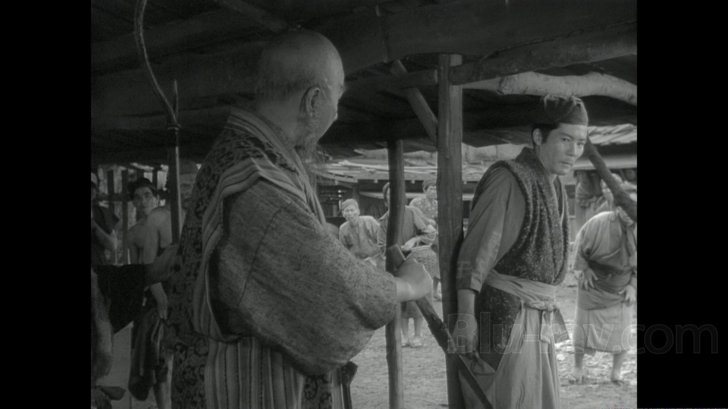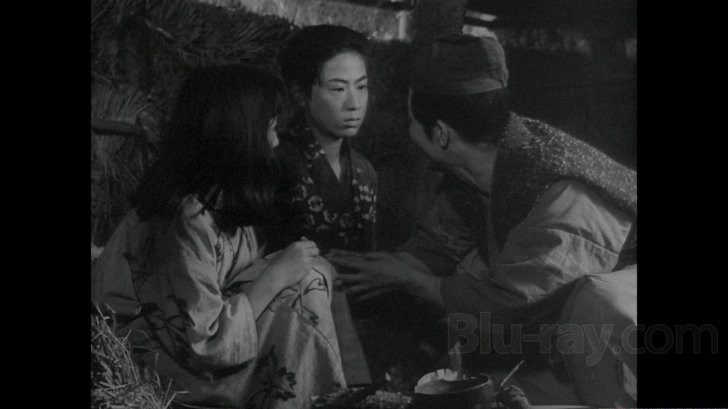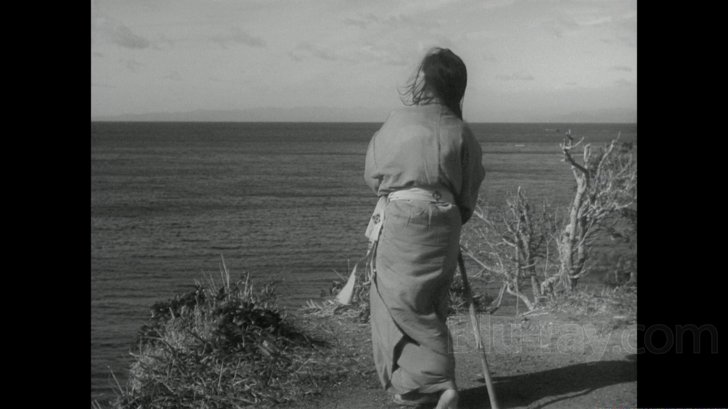Sanshô Dayű / Gion Bayashi Blu-ray Movie
HomeSanshô Dayű / Gion Bayashi Blu-ray Movie 
山椒大夫 / 祇園囃子 | Sansho the Bailiff / A Geisha | Masters of Cinema / Blu-ray + DVDEureka Entertainment | 1954 | 2 Movies | 209 min | Rated BBFC: PG | Apr 23, 2012
Movie rating
8.4 | / 10 |
Blu-ray rating
| Users | 0.0 | |
| Reviewer | 4.5 | |
| Overall | 4.5 |
Overview
Sanshô Dayű / Gion Bayashi (1954)
When an idealistic governor disobeys the reigning feudal lord, he is cast into exile, his wife and children left to fend for themselves and eventually wrenched apart by vicious slave traders.
Starring: Kinuyo Tanaka, Kyôko Kagawa, Yoshiaki Hanayagi, Akitake Kôno, Masao Shimizu (I)Director: Kenji Mizoguchi
| Foreign | Uncertain |
| Drama | Uncertain |
| Period | Uncertain |
Specifications
Video
Video codec: MPEG-4 AVC
Video resolution: 1080p
Aspect ratio: 1.33:1
Original aspect ratio: 1.37:1
Audio
Japanese: DTS-HD Master Audio 2.0
Japanese: DTS-HD Master Audio 2.0
Subtitles
English
Discs
50GB Blu-ray Disc
Three-disc set (1 BD, 2 DVDs)
DVD copy
Playback
Region B (locked)
Review
Rating summary
| Movie | 5.0 | |
| Video | 4.0 | |
| Audio | 4.0 | |
| Extras | 3.5 | |
| Overall | 4.5 |
Sanshô Dayű / Gion Bayashi Blu-ray Movie Review
Reviewed by Dr. Svet Atanasov May 9, 2012Winner of Silver Lion Award at the Venice Film Festival, Japanese director Kenji Mizoguchi's "Sanshô Dayű" a.k.a "Sansho the Bailiff" (1954) arrives on Blu-ray courtesy of British distributors Eureka Entertainment. The supplemental features on the disc include a video introduction by film critic Tony Ryans; Kenji Mizoguchi's film "Gion Bayashi" a.k.a "A Geisha" (1953); original Japanese teaser and trailer for it; and a second video interview with film critic Tony Rayns. The disc also arrives with an illustrated booklet featuring rare archival imagery and a full reprint of the 1915 Ogai Mori story adapted in "Sanshô Dayű". In Japanese, with optional Japanese subtitles for the two films. Region-B "locked".

I won't do it, father...
Sanshô dayű
11th century Japan. A well respected governor (Masao Shimizu, Sanjuro) is sent into exile by his opponents. A few years later, his wife, Tamaki (Kinuyo Tanaka, The Ballad of Narayama), son, Zushio (Yoshiaki Hanayagi), daughter, Anju (Kyôko Kagawa, Madadayo) and their servant head to the island where he lives. Along the way they meet a priestess (Kikue Mori) who suggests that they use the services of two boatmen, both supposedly the best in the area. The travelers agree, but the boatmen turn out to be bandits. Tamaki and the servant are sold to the owner of a popular brothel, while Zusho and Anju are sold to Sansho (Eitarô Shindô, Drunken Angel), the brutal owner of a slave camp.
During the next ten years, Zusho and Anju are forced to work and live as slaves. Most of the time they are separated, as the men and women in Sansho's camp have different responsibilities and work in different areas. When occasionally they meet, they wonder what might have happened to Tamaki.
The living conditions in Sansho’s camp are terrible. Suffering from exhaustion, dehydration and malnutrition, the slaves routinely collapse while working and the weakest often die. The guards dispose of the bodies in the nearby forest. Taro (Akitake Kôno, The Men Who Tread on the Tiger's Tail), Sansho’s son, is so disgusted by his father’s cruelty that eventually he leaves the camp and becomes a monk.
Meanwhile, Zusho’s personality slowly changes and he becomes like the rest of the salves – living day by day and following blindly the orders of the guards. Anju continues to believe that one day she and Zusho will manage to escape the camp and reunite with their mother and father.
One day, Zusho and Anju are ordered to take a dying slave in the forest. While they collect branches, Anju manages to convince Zusho that the right time to escape has finally come. Zusho takes the slave to a nearby Buddhist temple, but Anju decides to stay because she is too weak to follow him. When word reaches Sansho that one of his slaves has escaped, he immediately orders his men to go after him.
Eventually, fortune smiles on Zusho – because of his late father’s unmatched bravery and compassion, he is appointed governor of the province where Sansho resides. He quickly declares slavery unlawful and confronts Sansho. Then, after he resigns, he begins looking for Anju and his mother.
Based on a story by Ogai Mori, Kenji Mizoguchi’s Sansho Dayu is a spectacular period drama that is widely considered by many film scholars and critics to be one of the greatest Japanese films ever made.
The story the film tells is simple, but there are multiple key characters that are followed closely. Additionally, past and present are closely intertwined, but a narrator points out the time changes and the important facts that are worth remembering.
The film is firmly grounded in reality and free of melodrama. Sansho’s camp, for example, is a cesspool where people are literally treated as objects. There are no graphic scenes, but the brutality is very authentic. The manner in which the guards treat the women, in particular, is quite disturbing.
As the story progresses each of the key characters faces different dilemmas. What makes the film so fascinating to behold, however, is not how they solve them, but how they perceive and judge each others' actions. Their views and the statements they produce reveal a lot about the socio-political conditions in 11th century Japan.
The film is filled with endless beautiful long shots. Especially during the second half the fluid camera movement, a Mizoguchi trademark, is very impressive.
Note: In 1954, Sansho Dayu won Silver Lion Award at the Venice Film Festival.
Gion bayashi
Mizoguchi completed A Geisha in 1953. The film follows the relationship between two women, both geishas, who live in the city of Kyoto. The older and more experienced one, Miyoharu (Michiyo Kogure), agrees to teach the younger one, Eiko (Ayako Wakao), how to create a name for herself. As their relationship progresses, the two women gather the courage to confront various old traditions – and discover that post-war Japan is a lot like pre-war Japan.
Sanshô Dayű / Gion Bayashi Blu-ray Movie, Video Quality 

Presented in an aspect ratio of 1.33:1, encoded with MPEG-4 AVC and granted a 1080p transfer, Kenji Mizoguchi's Sanshô Dayű arrives on Blu-ray courtesy of Eureka Entertainment.
The screencaptures included with our review appear in the following order:
1. Sanshô Dayű: 1-19.
2. Gion Bayashi: 20-29.
The basic characteristics of the high-definition transfers are very similar to those of the one used for the Blu-ray release of Ugetsu Monogatari. There are a few small flecks and scratches that pop up here and there, but absolutely no trances of problematic lab tinkering. Detail is indeed very pleasing, with the daylight panoramic vistas looking particularly strong (see screencapture #13). Clarity is also good, with the most dramatic improvements noticeable during the dusk/nighttime scenes - the light macroblocking has been eliminated and the black levels further stabilized. Film grain is fairly evenly distributed throughout the entire film, though some of it is mixed with extremely light noise (see screencapture #2). Serious banding and aliasing patterns do not plague the high-definition transfer. Finally, aside from some inherited frame skips, there are no serious stability issues to report in this review.
Gion Bayashi looks slightly softer, but there are large portions of the film/transfer that are surprisingly healthier (there are hardly any flecks or scratches). Contrast levels are stable and clarity pleasing. Once again, there are no traces of problematic lab tinkering. Unsurprisingly, despite some of the source limitations the film boasts strong organic qualities.
(Note: This is a Region-B "locked" Blu-ray disc. Therefore, you must have a native Region-B or Region-Free PS3 or SA in order to access its content).
Sanshô Dayű / Gion Bayashi Blu-ray Movie, Audio Quality 

There are two standard audio tracks on this Blu-ray disc: Japanese DTS-HD Master Audio 2.0, for Sanshô Dayű, and Japanese DTS-HD Master Audio 2.0, for Gion Bayashi. For the record, Eureka Entertainment have provided optional English subtitles for both features.
There is a bit of light background hiss on the lossless track for Sanshô Dayű. However, it is far from distracting, and clarity is actually surprisingly good. Predictably, the overall dynamic amplitude on both lossless tracks is rather limited, but there are no serious compromises; both films simply have very modest sound designs. For the record, there are no audio dropouts or high-frequency distortions to report in this review. The English translation is excellent.
Sanshô Dayű / Gion Bayashi Blu-ray Movie, Special Features and Extras 

- Tony Rayns on Sanshô Dayű - film critic Tony Rayns discusses Kenji Mizoguchi's film, its production history, construction and its placement in the Japanese director's body of work. Tony Rayns also discusses the new trends on the Japanese film market during the '50s. In English, not subtitled. (11 min, 480/60i).
- Tony Rayns on Mizoguchi, Sanshô Dayű, and Gion Bayashi - in this long and very informative video interview, film critic Tony Rayns discusses Mizoguchi's career, his relationship with producer Masaichi Nagata, the pressure of the Japanese film industry and its effect on the director's work, etc. In English, not subtitled. (28 min, 480/60i).
- Teaser - original Japanese teaser for Gion Bayashi. In Japanese, with optional English subtitles. (3 min, 480/60i).
- Trailer - original Japanese trailer for Gion Bayashi. In Japanese, with optional English subtitles. (4 min, 480/60i).
- Booklet - an illustrated booklet featuring rare archival imagery and a full reprint of the 1915 Ogai Mori story adapted in Sanshô Dayű.
Sanshô Dayű / Gion Bayashi Blu-ray Movie, Overall Score and Recommendation 

Anyone interested in classic Asian cinema should make plans to obtain this excellent release of Kenji Mizoguchi's Sanshô Dayű. As it was the case with Eureka Entertainment's equally impressive release of Ugetsu Monogatari, as a bonus the British distributors have also included the excellent Gion Bayashi. With these two releases, and Artificial Eye's The Mizoguchi Collection, this is turning out to be quite a special year for fans of Kenji Mizoguchi and Japanese cinema. VERY HIGHLY RECOMMENDED.
Other editions
Sansho the Bailiff: Other Editions

Sansho the Bailiff
山椒大夫 / Sanshô dayű
1954

Sansho the Bailiff
山椒大夫 / Sanshô dayű
1954

Sanshô Dayű / Gion Bayashi
山椒大夫 / 祇園囃子 | Sansho the Bailiff / A Geisha | Masters of Cinema
1954
Similar titles
Similar titles you might also like

The Life of Oharu
西鶴一代女 / Saikaku ichidai onna
1952

Akasen chitai / Yôkihi
赤線地帯 / 楊貴妃 | Street of Shame / Princess Yang Kwei-Fei | Masters Of Cinema
1956

Throne of Blood 4K
蜘蛛巣城 / Kumonosu-jô
1957

Ugetsu 4K
雨月物語 / Ugetsu monogatari
1953

Kagemusha
影武者
1980

Harakiri
切腹 / Seppuku / Masters of Cinema
1962

The Painted Bird
Nabarvené ptáce / Montage Pictures
2019

Loveless
Нелюбовь / Nelyubov
2017

Oyű-sama
1951

Tokyo Story
Remastered | 東京物語 / Tôkyô monogatari
1953

Umberto D.
1952

The Insect Woman / Nishi-Ginza Station
にっぽん昆虫記 / 西銀座駅前 | Nippon konchűki / Nishi Ginza ekimae | Masters of Cinema
1963

Pather Panchali
পথের পাঁচালী / Song of the Little Road
1955

Norte, the End of History
Norte, hangganan ng kasaysayan
2013

A Brighter Summer Day
牯嶺街少年殺人事件 / Gǔ lǐng jiē shào nián shā rén shì jiàn
1991

Accattone
Masters of Cinema
1961

Three Colours: Blue
Trois couleurs: Bleu
1993

The Club
El Club
2015

Late Spring
晩春 / Banshun
1949

Sisters of the Gion
Gion no shimai
1936
